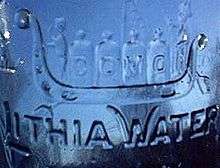Lithia water

Lithia water is defined as a type of mineral water characterized by the presence of lithium salts (as lithium carbonate or lithium chloride).[1] Natural lithia mineral spring waters are rare and there are few commercially bottled lithia water products. An example of a noncommercial lithia water can be found in Ashland, Oregon's Lithia Park, a popular tourist attraction because of its lithia water fountain. The water is pumped from a spring to a fountain where thousands of people come to drink the water for its alleged health benefits. An example of a commercially bottled lithia spring water product is Lithia brand water. One other example of lithia water is Bear-lithia water, a mineral water from Bear-Lithia Springs, Virginia. It contains carbonates of calcium and magnesium.
History
Between the 1880s and World War I, the consumption for bottled lithia mineral water reached gigantic proportions.[2] The most premium of all the mineral water brands were lithia waters because of their acclaimed health benefits. One of the first commercially sold lithia waters in the United States was bottled at Lithia Springs, Georgia in 1888.[3] During this era there was such a demand for lithia water that there was a proliferation of bottled lithia water products, however only a few were natural lithia spring waters. Most of the bottled lithia water brands added lithium bicarbonate to spring water and called it lithia water. With the advent of World War I and the formation of the new US government food safety agency, mineral water bottlers were under scrutiny. The new agency posted large fines against mineral water bottlers for mislabeled, misrepresented, and adulterated products.[4] These government actions and their publicity along with public works that made clean tap water readily accessible caused the American public to lose confidence and interest in bottled mineral water.[4]
Research
The health benefits of lithia water have been supported by countless testimonials, but no independent scientific research had been conducted on lithia water until the 1980s.
A published researched study in 1992 about trace elements indicated that individuals with heart disease, learning-disabilities, and incarcerated violent criminals were found to have lithium deficiencies (as measured through hair sample analysis).[5]
Research studies measuring the effects of trace levels of lithium, commonly found in lithia waters, have demonstrated neuroprotective abilities,[6] as well as improvements in mood and cognitive function.[7]
In 1949, psychiatrist John Cade discovered the anti-manic effects of lithium ions. This finding led to lithium carbonate to be used to treat mania. Lithium compounds yield positive outcomes as a treatment for bipolar disorder.[8]
Research studies published by the British Journal of Psychiatry 2009 found that communities with naturally occurring lithia waters have lower suicide rates, mental hospital admissions, incidences of crimes, and arrests related to drug addictions.[9]
On February 8, 2011, German researchers at Friedrich Schiller University Jena published their findings in the European Journal of Nutrition (Nature Publishing Group) indicating that lithia waters lead to an increased life expectancy in humans and metazoans.[10] The researchers concluded the following: Taken together, these findings indicate that long-term low-dose exposure to lithium may exert anti-aging capabilities and unambiguously decreases mortality in evolutionary distinct species.
A clinical pilot study using ĔDJ lithia water from British Columbia was underway at the University of British Columbia, but was terminated.[11] It was to investigate whether daily use of lithia water will improve new brain cell formation (neurogenesis) and reduce neuronal oxidative stress (neuroprotection).
"Dr. Nassir Ghaemi, a professor of psychiatry at Tufts University School of Medicine and one of the most active and informed proponents of lithium in the medical community, notes: 'Lithium is, by far, the most proven drug to keep neurons alive, in animals and in humans, consistently and with many replicated studies.' And, he added, 'If lithium prevents dementia, then we may have overlooked a very simple means of preventing a major public health problem.'" [12]
See also
- Lithia, a brand of bottled lithia water sourced from Lithia Springs since 1888
- Londonderry Lithia, a brand of bottled lithia water produced during the late 19th and early 20th centuries
References
- ↑ Merriam-Webster Dictionary " http://www.merriam-webster.com/dictionary/lithia%20water"
- ↑ Loring Bullard (2004) "Healing waters: Missouri's historic mineral springs and spas"
- ↑ Davis, Fannie Mae Davis (1987). From Indian Trail to Interstate 20 , Douglas County History book, USA.
- 1 2 De Vierville (1992) "American Healing Waters"
- ↑ Schrauzer et al. Lithium in scalp hair of adults, students, and violent criminals. BIOLOGICAL TRACE ELEMENT RESEARCH 34(2): 161-76. 1992
- ↑ Xu et al. Chronic Treatment With a Low Dose of Lithium Protects the Brain Against Ischemic Injury by Reducing Apoptotic Death. STROKE 2003;34;1287-1292;
- ↑ Schrauzer, De Vroey. Effects of Nutritional Lithium Supplementation on Mood. BIOLOGICAL TRACE ELEMENT RESEARCH Volume 40 1994 pages 89-101
- ↑ Natural low dose lithium supplementation in manic-depressive disease. NUTRITION PERSPECTIVES - University of California Davis January, 1988: 10-11
- ↑ Ohgami et al. Lithium levels in drinking water and risk of suicide. THE BRITISH JOURNAL OF PSYCHIATRY 2009; 194:464-465
- ↑ Zarse, K. et al. (2011): Low-dose lithium uptake promotes longevity in humans and metazoans.. In: Eur J Nutr 50(5):387-389; PMID 21301855; pdf full text doi:10.1007/s00394-011-0171-x
- ↑ http://clinicaltrials.gov/ct2/show/NCT01257867?term=NCT01257867&rank=1
- ↑ "Should We All Take a Bit of Lithium?" by Anna Fels Sept http://www.nytimes.com/2014/09/14/opinion/sunday/should-we-all-take-a-bit-of-lithium.html?_r=0